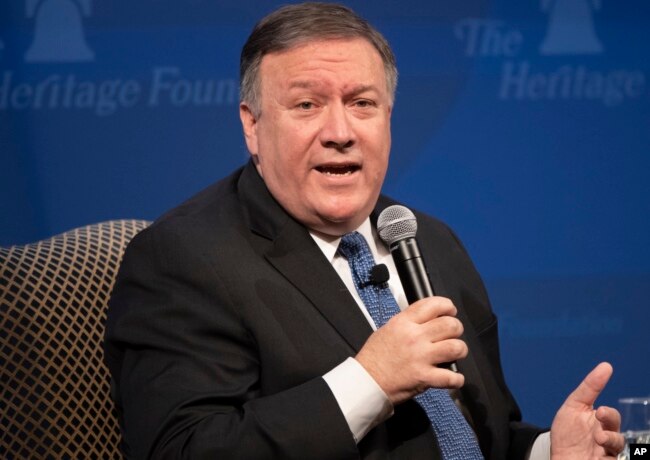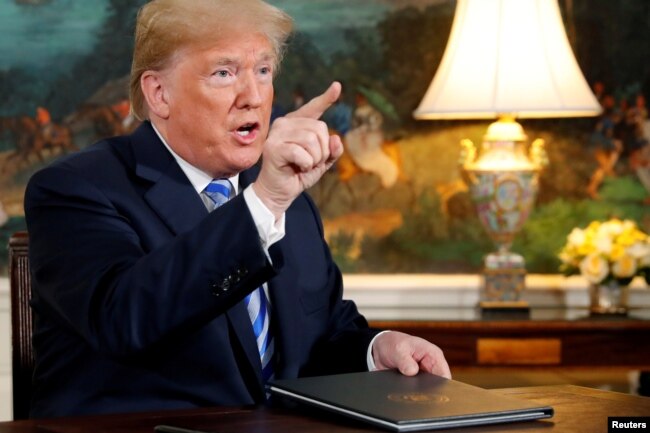VOA – The head of Iran’s most powerful military body on Tuesday rejected U.S. President Donald Trump’s offer of direct talks with Iranian leaders, saying Tehran never would allow talks with what he called the “Great Satan.”
The commander of Iran’s Islamic Revolutionary Guard Corps, Mohammad Ali Jafari, made the comment in an open letter published by Iran’s state-controlled Fars News Agency.
In the letter, Jafari said Iran never would allow talks with the Great Satan, his label for the U.S., because the nation’s faith in Islam has made it “enormously different from submissive nations.” Jafari also described Trump as an “amateurish president” whose wish for Iranian officials to request a meeting would go with him “to the grave.”
Jafari was the most senior Iranian official to respond directly to Trump’s Monday offer, made at a White House news conference, to talk with Iranian leaders about their nuclear program without preconditions.
Earlier Tuesday, a U.S. official said Secretary of State Mike Pompeo had no intention of meeting his Iranian counterpart at an international gathering this weekend in Singapore.
The top U.S. diplomat and Iranian Foreign Minister Mohammad Javad Zarif will attend Saturday’s meeting of the 10-nation Association of Southeast Asian Nations. But the senior U.S. State Department official said there were no plans for the two officials to meet.
The official said that North Korea also would be represented at the Singapore meeting, and while chance encounters for Pompeo are possible, no bilateral meetings have been scheduled.
Trump, who pulled the U.S. out of the 2015 international agreement to restrain Iran’s alleged nuclear weapons development in exchange for relief from economic sanctions against Tehran, said Monday that he would be willing to meet with Iranian President Hassan Rouhani. Iran denies seeking nuclear weapons.
“I believe in meeting,” Trump said at a White House news conference. “Speaking to other people, especially when you’re talking about potentials of war and death and famine and lots of other things, you meet. There’s nothing wrong in meeting.”
Trump noted his recent one-on-one discussions with North Korean leader Kim Jong Un and Russian President Vladimir Putin as examples of his direct diplomacy with leaders deemed hostile to U.S. interests.
“So, I would certainly meet with Iran if they wanted to meet. I don’t know that they’re ready yet. They’re having a hard time right now,” Trump added. “I’m ready to meet anytime they want to.”
Asked if he had any preconditions for such a meeting, Trump replied: “No preconditions. If they want to meet, I’ll meet.”
Later, in an interview with the cable television network CNBC, Pompeo said Trump was prepared to sit down with the Iranians if they “make fundamental changes in how they treat their own people, reduce their malign behavior,” and agree it is worthwhile to put in place a nuclear agreement “that actually prevents proliferation.”
Some lower-ranking Iranian officials have responded by saying the path to direct discussions with Washington would have to include a U.S. return to the Joint Comprehensive Plan of Action, as the nuclear deal involving Iran, China, France, Russia, Britain, Germany, the U.S. and the European Union was formally called.
“Respecting the Iranian nation’s rights, reducing hostilities and returning to the nuclear deal are steps that can be taken to pave the bumpy road of talks between Iran and America,” Hamid Aboutalebi, an adviser to Rouhani, tweeted.
Analysts do not expect a Trump-Rouhani meeting anytime soon, pointing out that Trump has, for some time, been seeking to meet Rouhani directly without success.
“I don’t think it will happen in the immediate future,” said Jarrett Blanc, senior fellow of the Geoeconomics and Strategy Program at the Carnegie Endowment for International Peace in Washington.
Iran, with a more complicated domestic political structure than the totalitarian model of North Korea, has been cool to the idea of diplomacy with Washington, more so since Trump pulled the United States out of the multinational nuclear accord, which imposed restrictions on Iran’s ability to build nuclear weapons in exchange for sanctions relief.
Other signatories are working with Iran to try to save the agreement while Washington begins reimposing sanctions on Tehran. They are to start taking effect in August.
“Iranian leadership has presented Trump as a bully and has presented the U.S. withdrawal from the nuclear deal as a betrayal of trust. So, it’s really hard for the Iranian leadership to now turn around and start negotiation from scratch,” said Shahram Akbarzedeh, a research professor in Middle East and Central Asian politics at Australia’s Deakin University.
Last week, Trump issued a direct counterthreat to Tehran in an all-capital-letters tweet in which he sharply warned Rouhani to “never threaten the United States” or the Islamic Republic would suffer historic consequences.
Just hours before that tweet, Rouhani had warned Trump’s policies could lead to “the mother of all wars.”
“No Iranian leader is likely in the near future to meet with a president who has repeatedly threatened Iran, insulted its leadership and violated the nuclear deal,” said Ali Vaez, Iran project director at the International Crisis Group.
This report was produced in collaboration with VOA’s Persian service. VOA’s Cindy Saine contributed to this report.
 Shabtabnews In this dark night, I have lost my way – Arise from a corner, oh you the star of guidance.
Shabtabnews In this dark night, I have lost my way – Arise from a corner, oh you the star of guidance.




